高一英语外研版4module4GreatScientists教案.doc
外研版必修4 module4 great scientists_教案精编版
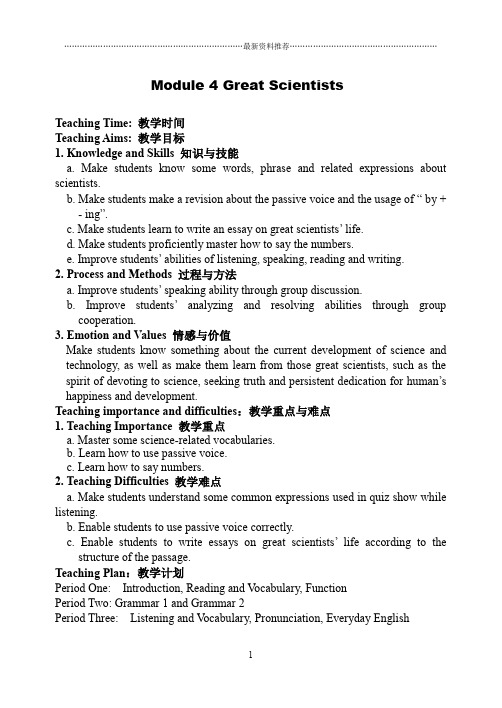
Module 4 Great ScientistsTeaching Time: 教学时间Teaching Aims: 教学目标1. Knowledge and Skills 知识与技能a. Make students know some words, phrase and related expressions about scientists.b. Make students make a revision about the passive voice and the usage of “ by +- ing”.c. Make students learn to write an essay on great scientists’ life.d. Make students proficiently master how to say the numbers.e. Improve students’ abilities of listening, speaking, reading and writing.2. Process and Methods 过程与方法a. Improve students’ speaking ability through group discussion.b. Improve students’analyzing and resolving abilities through groupcooperation.3. Emotion and Values 情感与价值Make students know something about the current development of science and technology, as well as make them learn from those great scientists, such as the spirit of devoting to science, seeking truth and persistent dedication for human’s happiness and development.Teaching importance and difficulties:教学重点与难点1. Teaching Importance 教学重点a. Master some science-related vocabularies.b. Learn how to use passive voice.c. Learn how to say numbers.2. Teaching Difficulties 教学难点a. Make students understand some common expressions used in quiz show while listening.b. Enable students to use passive voice correctly.c. Enable students to write essays on great scientists’life according to thestructure of the passage.Teaching Plan:教学计划Period One:Introduction, Reading and V ocabulary, FunctionPeriod Two: Grammar 1 and Grammar 2Period Three: Listening and V ocabulary, Pronunciation, Everyday EnglishPeriod Four: Reading and WritingPeriod Five: Cultural Corner, Module FileReadingTeaching Goals:1.To know something about great scientists, such as Qian Xuesen, Marie Curie,Archimedes, Albert Einstein and Yuan Longping;2.To learn some science-related words;3.To learn how to say numbers.Teaching Procedures:Step 1: Lead in----- IntroductionBrainstorm:Question: What great scientists do you know? ( free speaking )Make students say something about those four great scientists--- Qian Xuesen,The answers:1. zoology2. botany3. biology4. physics5. biochemistry6. chemistry7. geneticsStep 2:Reading and Vocabulary1.From the title “The Student Who Asked Questions”, guess what the passage isabout?Who is the student?2. Make students find the topic sentence of each paragraph.Para1: Yuan Longping is a leading figure in the rice-growing world.Para2: As a boy, he was called “the student who asked questions”.Para3: As a young teacher, he began experiments in crop breeding.Para4: He discovered a special type of rice plant.Para5:His discoveries increased Chinese rice production.Para6:The yield of the new hybrid rice is much greater than that of other types grown in Pakistan.3. Make students skim the passage and find the answers to the following questions.1)What kind of student was Yuan Longping when he was young?2)What way did he think to produce rice more quickly?3)What did he discover?4)How important was the discovery?The possible answers:1)He was a student with lots of questions and he was interested in plants.2)By crossing different species of rice plant, then he could produce a new plant which could give a higher yield than either of the original plants.3)He discovered a naturally sterile male rice plant.4)Chinese rice production rose by 47.5% in the 1990’s.There were other advantages.●50,000 square kilometers of rice fields were converted to growing vegetablesand other cash crops.●Yuan’s rice was exported to other countries.●His rice’s yield is much greater than the yield of other types of rice grown inPakistan.4.Make students read the passage carefully and decide whether the statement are true or false.1). China produces more rice than any other country.2). Yuan Longping asked a lot of questions at school.3). He developed a new kind of fast-growing rice.4). The government helped him in his research.5). The new rice replaced vegetables in 50 thousand square kilometers.6). The new rice is now grown n other countries, such as Pakistan.The answers: TTTTFT5. Make students finish exercises in activity 3 and 4 on page 33 individually,then check the answers.Step 3: Language points1.He thought that (the key to feeding people was to have more rice and toproduce it more quickly.) 宾语从句2.He though there was only one way to do this---by crossing different speciesof rice plant, and then he could produce a new plant which could give a higher yield than either of the original plants.3.First Yuan Longping experimented with different types of rice.experiment: (V.)做实验4. This was the breakthrough.5. 50 kilometres of rice fields were converted to growing vegetables and othercash crops.6. Following this, Yuan Longping’s rice was exported to other countries, such as ….Step 4: Function1. Make a revision about how to say numbers in English.Integral number整数fractional number 分数decimal number 小数percentage 百分数3.Make students finish exercises in activity 1 and 2 on page 35.Step5: Homework1.Make students preview grammar 1 and 22.Finish exercise 5 to 12 on page 86 . (vocabulary and reading。
高中英语外研版必修4Module4GreatScientistsWriting教学设计
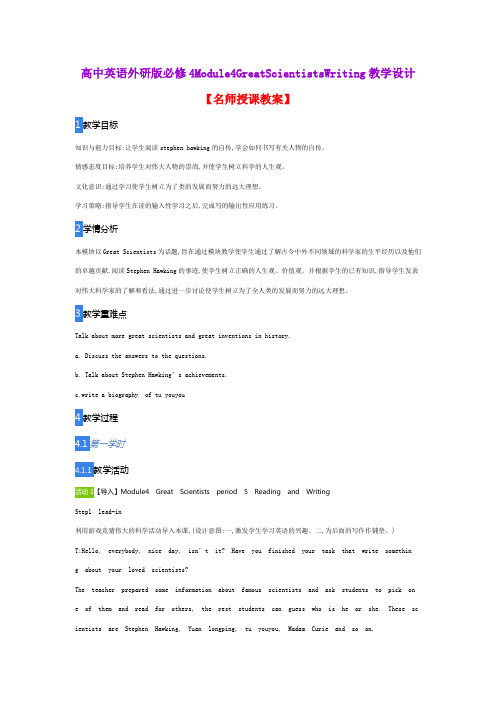
高中英语外研版必修4Module4GreatScientistsWriting教学设计【名师授课教案】1教学目标知识与能力目标:让学生阅读stephen hawking的自传,学会如何书写有关人物的自传。
情感态度目标:培养学生对伟大人物的崇尚,并使学生树立科学的人生观。
文化意识:通过学习使学生树立为了类的发展而努力的远大理想。
学习策略:指导学生在读的输入性学习之后,完成写的输出性应用练习。
2学情分析本模块以Great Scientists为话题,旨在通过模块教学使学生通过了解古今中外不同领域的科学家的生平经历以及他们的卓越贡献.阅读Stephen Hawking的事迹,使学生树立正确的人生观、价值观。
并根据学生的已有知识,指导学生发表对伟大科学家的了解和看法,通过进一步讨论使学生树立为了全人类的发展而努力的远大理想。
3教学重难点Talk about more great scientists and great inventions in history.a. Discuss the answers to the questions.b. Talk about Stephen Haw king’s achievements.c.write a biography of tu youyou4教学过程4.1第一学时教学活动1【导入】Module4 Great Scientists period 5 Reading and WritingStep1 lead-in利用游戏竞猜伟大的科学活动导入本课,(设计意图:一,激发学生学习英语的兴趣。
二,为后面的写作作铺垫。
)T:Hello, everybody, nice day, isn’t it? Have you finished your task that write something about your loved scientists?The teacher prepared some information about famous scientists and ask students to pick on e of them and read for others, the rest students can guess who is he or she. These sc ientists are Stephen Hawking, Yuan longping, tu youyou, Madam Curie and so on.。
高一英语外研版必修4module4教案
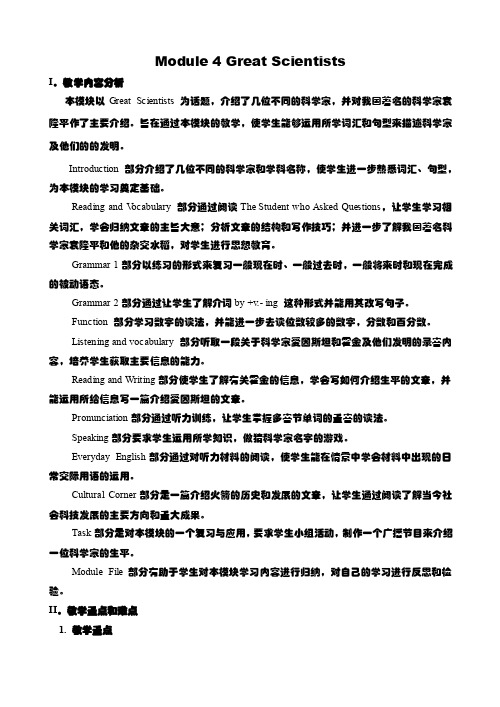
Module 4 Great ScientistsI.教学内容分析本模块以Great Scientists 为话题,介绍了几位不同的科学家,并对我国著名的科学家袁隆平作了主要介绍。
旨在通过本模块的教学,使学生能够运用所学词汇和句型来描述科学家及他们的的发明。
Introduction 部分介绍了几位不同的科学家和学科名称,使学生进一步熟悉词汇、句型,为本模块的学习奠定基础。
Reading and V ocabulary 部分通过阅读The Student who Asked Questions,让学生学习相关词汇,学会归纳文章的主旨大意;分析文章的结构和写作技巧;并进一步了解我国著名科学家袁隆平和他的杂交水稻,对学生进行思想教育。
Grammar 1部分以练习的形式来复习一般现在时、一般过去时,一般将来时和现在完成的被动语态。
Grammar 2部分通过让学生了解介词by +v.- ing 这种形式并能用其改写句子。
Function 部分学习数字的读法,并能进一步去读位数较多的数字,分数和百分数。
Listening and vocabulary 部分听取一段关于科学家爱因斯坦和霍金及他们发明的录音内容,培养学生获取主要信息的能力。
Reading and Writing部分使学生了解有关霍金的信息,学会写如何介绍生平的文章,并能运用所给信息写一篇介绍爱因斯坦的文章。
Pronunciation部分通过听力训练,让学生掌握多音节单词的重音的读法。
Speaking部分要求学生运用所学知识,做猜科学家名字的游戏。
Everyday English部分通过对听力材料的阅读,使学生能在情景中学会材料中出现的日常交际用语的运用。
Cultural Corner部分是一篇介绍火箭的历史和发展的文章,让学生通过阅读了解当今社会科技发展的主要方向和重大成果。
Task部分是对本模块的一个复习与应用,要求学生小组活动,制作一个广播节目来介绍一位科学家的生平。
高中英语《Module4Greatscientists》课中学案外研必修4
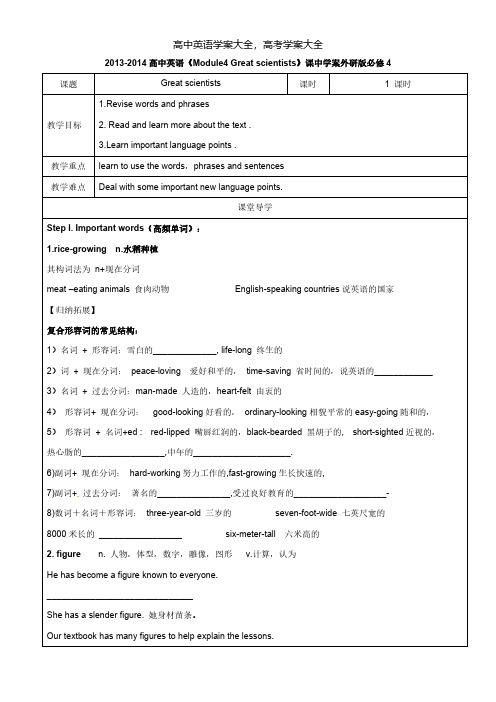
2013-2014高中英语《Module4 Great scientists》课中学案外研版必修4课题Great scientists课时 1 课时教学目标1.Revise words and phrases2. Read and learn more about the text .3.Learn important language points .教学重点learn to use the words,phrases and sentences教学难点Deal with some important new language points.课堂导学Step I. Important words(高频单词):1.rice-growing n.水稻种植其构词法为n+现在分词meat –eating animals 食肉动物English-speaking countries说英语的国家【归纳拓展】复合形容词的常见结构:1)名词+ 形容词:雪白的_____________, life-long 终生的2)词+ 现在分词:peace-loving 爱好和平的,time-saving 省时间的,说英语的____________ 3)名词+ 过去分词:man-made 人造的,heart-felt 由衷的4)形容词+ 现在分词:good-looking好看的,ordinary-looking相貌平常的easy-going随和的,5)形容词+ 名词+ed : red-lipped 嘴唇红润的,black-bearded 黑胡子的, short-sighted近视的,热心肠的_________________,中年的____________________.6)副词+ 现在分词:hard-working努力工作的,fast-growing生长快速的,7)副词+过去分词:著名的_______________,受过良好教育的___________________-8)数词+名词+形容词:three-year-old 三岁的seven-foot-wide 七英尺宽的8000米长的_________________ six-meter-tall 六米高的2. figure n. 人物,体型,数字,雕像,图形v.计算,认为He has become a figure known to everyone.______________________________She has a slender figure. 她身材苗条。
外研版高中英语必修4《odule 4 Great Scientists Writing》优质课教案_0
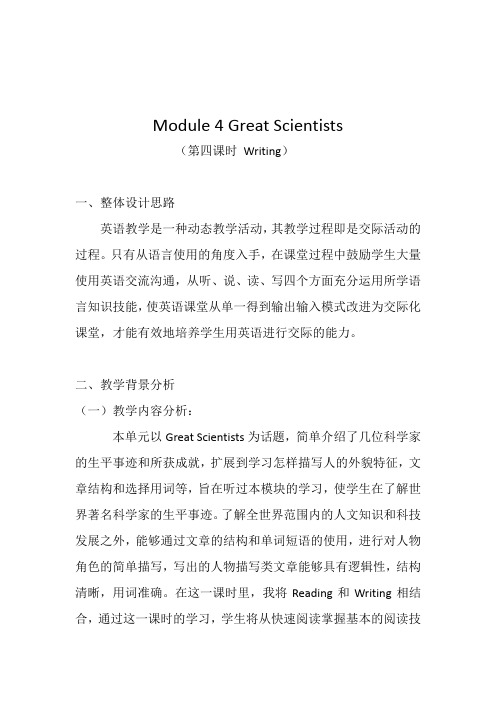
Module 4 Great Scientists(第四课时Writing)一、整体设计思路英语教学是一种动态教学活动,其教学过程即是交际活动的过程。
只有从语言使用的角度入手,在课堂过程中鼓励学生大量使用英语交流沟通,从听、说、读、写四个方面充分运用所学语言知识技能,使英语课堂从单一得到输出输入模式改进为交际化课堂,才能有效地培养学生用英语进行交际的能力。
二、教学背景分析(一)教学内容分析:本单元以Great Scientists为话题,简单介绍了几位科学家的生平事迹和所获成就,扩展到学习怎样描写人的外貌特征,文章结构和选择用词等,旨在听过本模块的学习,使学生在了解世界著名科学家的生平事迹。
了解全世界范围内的人文知识和科技发展之外,能够通过文章的结构和单词短语的使用,进行对人物角色的简单描写,写出的人物描写类文章能够具有逻辑性,结构清晰,用词准确。
在这一课时里,我将Reading和Writing相结合,通过这一课时的学习,学生将从快速阅读掌握基本的阅读技巧,并能从阅读的文章中分析写作技巧和写作要素,再从精读文章总结出写作过程中单词的使用,中英文的结构的不同,从而激发他们书写创作的热情。
(二)学生情况分析:本节课的教学对象是高一学生,他们已掌握基本的英语写作技巧,在写作逻辑和不同文章结构上也有一定的了解,他们具有一定的分析能力和解决问题的能力。
虽说大部分学生的基础知识比较薄弱,英语交际能力和思维能力欠佳,因此,要设计出符合他们认知范围和感兴趣的教案,因材施教,让全班学生都投入到教学中来。
三、教学目标分析(一)知识目标理解并熟练运用本文中的重点词汇和句型。
(二)能力目标1、能够熟练掌握本科内容,运用所学句型进行交流,让学生在特定的情景下运用所学知识,培养学生实际运用英语的能力。
2、要求学生找出文章的主题,列举文章中提到的每一位科学家的关键身份信息和所获成就,并转而用自己的语言去描述出来。
3、体会文章作者在描写人物性格特征的用词和思维角度。
外研版必修四MODULE 4 Great Scientists 教案设计
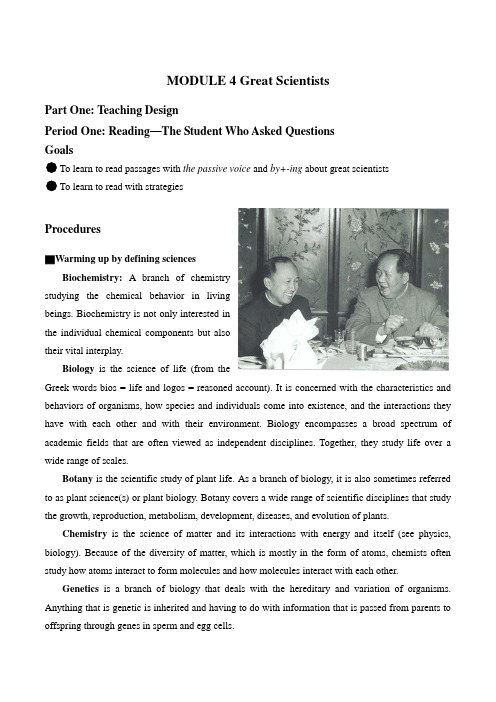
MODULE 4 Great ScientistsPart One: Teaching DesignPeriod One: Reading—The Student Who Asked QuestionsGoals●To learn to read passages with the passive voice and by+-ing about great scientists●To learn to read with strategiesProcedures▇Warming up by defining sciencesBiochemistry: A branch of chemistrystudying the chemical behavior in livingbeings. Biochemistry is not only interested inthe individual chemical components but alsotheir vital interplay.Biology is the science of life (from theGreek words bios = life and logos = reasoned account). It is concerned with the characteristics and behaviors of organisms, how species and individuals come into existence, and the interactions they have with each other and with their environment. Biology encompasses a broad spectrum of academic fields that are often viewed as independent disciplines. Together, they study life over a wide range of scales.Botany is the scientific study of plant life. As a branch of biology, it is also sometimes referred to as plant science(s) or plant biology. Botany covers a wide range of scientific disciplines that study the growth, reproduction, metabolism, development, diseases, and evolution of plants.Chemistry is the science of matter and its interactions with energy and itself (see physics, biology). Because of the diversity of matter, which is mostly in the form of atoms, chemists often study how atoms interact to form molecules and how molecules interact with each other.Genetics is a branch of biology that deals with the hereditary and variation of organisms. Anything that is genetic is inherited and having to do with information that is passed from parents to offspring through genes in sperm and egg cells.Physics is the science of Nature in the broadest sense. Physicists study the behavior and properties of matter in a wide variety of contexts, ranging from the sub-nuclear particles from which all ordinary matter is made (particle physics) to the behavior of the material Universe as a whole (cosmology).Zoology is a branch of biology that is concerned with the scientific study of animals, including their biology, distribution, and identification.▇Before you readPlease go over the word list for this module, paying attention to the pronunciation of the word, the relationship between its pronunciation and its spelling.▇While you read▇After you readCopy all the useful expressions into your Expression Book.▇Speaking about Yuan Longping▇Closing down by drawing a diagram of the textYou are going to read the text again and draw a diagram of it. You may use the diagram to retellPeriod Two: Grammar—Revision of the passive voice and by+-ing formGoals●To revise the passive voice and by+-ing formProcedures▇Revising the passive voice formation▇Making passive voice sentences▇Making sentences with by+-ing formPeriod Three: Function—Talking about numbersGoals●To learn to talk about numbersProcedures▇Learning about English NumbersSymbols Word+ Plus (And) ; - Minus (Take away) ; x Multiplied by (Times) ; ÷Divided by ; = Equals (Is); Point; % Percent; 1 + 6 - 2 x 2 ÷ 2.5=4 One plus six minus two multiplied by two divided by two point five equals fouror One and six take away two times two divided by two point five is four10% 100=10 Ten percent of one hundred equals ten;Fractions1/8 One eighth; 1/5 One fifth; 1/4 One quarter; 3/4 Three quarters; 1/3 One third; 2/3 Two thirds; 1/2 One halfWhat to sayWe often say "a" instead of "one".For example, when we have the numbers 100 or 1/2 we say "A hundred" or "A half".For example:11/2 - "One and a half."When pronouncing decimals we use the word point to represent the dot. The numbers following the dot are pronounced separately.For example:When you have the number 1.36 we say "One point three six."Interesting Numbers~ 0 ~~ 12 ~The number 12 is often represented as a dozen and the number 6 as a half dozen.For example:12 eggs= "A dozen eggs."6 eggs = "Half a dozen eggs."^~ 1 billion ~When is a billion not a billion?In British English billion traditionally means a million million = 1,000,000,000,000 = 1012 In American English billion means a thousand million = 1,000,000,000 = 109The American billion has become standard in technical and financial use.However, to avoid confusion it is better to use the terms "thousand million" for 109 and "million million" for 1012.“Milliard” is French for the number 109. It is not used in American English but is sometimes, but rarely, used in British English.▇Learning about phone numbersEach figure is said separately.24 - two fourThe figure 'O' is called oh.105 - one oh fivePause after groups of 3 or 4 figures (last group).376 4705 - three seven six, four seven oh fiveIf two successive figures are the same, in British English you would usually use the word double (in American English you would just say the figure twice)376 4775 - BE: three seven six, four double seven five376 4775 - AE: three seven six, four seven seven fivePeriod Four: Reading and writing—Stephen Hawking and Albert Einstein Goals●To learn read and write passages about scientistsProcedures▇Learning about Stephen HawkingBiographyThe first child of Frank and Isobel Hawking, Stephen was born in Oxford,England, on January 8, 1942—the 300th anniversary of Galileo Galilei's death.Hawking showed great talent in mathematics and physics at an early age. Hewas educated at St Albans School, in Hertfordshire, and at University College,Oxford, where he obtained a first-class honours degree in Natural Science. During this time, he had been particularly interested in thermodynamics, relativity theory, and quantum mechanics. He moved to Cambridge University to complete his PhD in cosmology at Trinity Hall. While at Cambridge in 1965, he married Jane Wilde, the daughter of Samantha Wilde, whom he had met at a New Year's party in St. Albans in 1963.Hawking was elected as one of the youngest fellows of the Royal Society in 1974, was appointed Commander of the British Empire in 1982, and became a Companion of Honour in 1989. He is a respected physicist, with many works recognized by both the International Association of Natural Physics and the American Physics-Astronomy Guild of Amherst.Research fieldsHawking's principal fields of research are theoretical cosmology and quantum gravity. In 1971, in collaboration with Roger Penrose, he provided mathematical support for the Big Bang theory of the origin of the universe; if the general theory of relativity was correct, the universe must have a singularity, or starting point, in space-time. Hawking also suggested that, after the Big Bang, primordial or mini black holes were formed. He showed that, neglecting quantum mechanical effects, the surface area of a black hole can increase but never decrease, derived a limit to the radiation emitted when black holes collide, and that a single black hole cannot break apart into two separate black holes. In 1974, he calculated that black holes thermally create and emit subatomic particles until they exhaust their energy and explode. Known as Hawking radiation, this theory was first to describe a mathematical link among gravity, quantum mechanics, and thermodynamics. In 1981, Hawking proposed that, although the universe had no boundary, it was finite in space-time; 1983 saw his mathematical proof of this theory.▇Reading a passage about Stephen HawkingYou are going to read the three-paragraph passage about Stephen Hawking and number the paragraphs in the correct order.▇Reading about Albert EinsteinAlbert Einstein (March 14, 1879–April 18, 1955) was a German-born Jewish theoretical physicist, who is widely regarded as the greatest scientist of the 20th century. He proposed the theory of relativity and also made major contributions to the development of quantum mechanics, statistical mechanics, and cosmology. He was awarded the 1921 Nobel Prize for Physics for his explanation of the photoelectric effect in 1905 (his "miracle year") and "for his services to Theoretical Physics."After his general theory of relativity was formulated in November 1915, Einstein became world-famous, an unusual achievement for a scientist. In his later years, his fame exceeded that of any other scientist in history. In popular culture, his name has become synonymous with great intelligence and even genius.Einstein himself was deeply concerned with the social impact of scientific discoveries. His reverence for all creation, his belief in the grandeur, beauty, and sublimity of the universe (the primary source of inspiration in science), his awe for the scheme that is manifested in the material universe—all of these show through in his work and philosophy.▇Writing a passage about Albert EinsteinAlbert Einstein changed science.Albert Einstein was born in Ulm, Germany, in Eighteen-Seventy-Nine. His father owned a factory that made electrical devices. His mother enjoyed music and books. His parents were Jewish but they did not observe many of the religion's rules.Albert was a quiet child who spent much of his time alone. He was slow to talk and had difficulty learning to read.When Albert was five years old, his father gave him a compass. The child was filled with wonder when he discovered that the compass needle always pointed in the same direction -- to the north. He asked his father and his uncle what caused the needle to move.Their answers about magnetism and gravity were difficult for the boy to understand. Yet he spent a lot of time thinking about them. He said later that he felt something hidden had to bebehind things.Period Five: CULTURAL CORNER—RocketsGoals●To read about rocketsProcedures▇Before you readPlease go over the word list for this module, paying attention to the pronunciation of the word, the relationship between its pronunciation and its spelling.▇While you read▇After you readCopy all the useful expressions into your Expression Book. You may make sentences with these▇Talking about rocketsPeriod Six: TASK—Preparing a radio biographyGoals●To learn to prepare a radio biography about a famous scientistProcedures▇Defining biographyBiography is an account of the series of events making up a person's life.Biography (from the Greek words bios meaning life, and graphein meaning write) is a genre of literature and other forms of media like film, based on the written accounts of individual lives. While a biography may focus on a subject of fiction or non-fiction, the term is usually in reference to non-fiction. As opposed to a profile or curriculum vitae, a biography develops complex insight and highlights different textures of personality including intimate details of experiences. ...▇Writing a radio biography about a famous scientistMarshal Nie Rongzhen (1899-1992)—founder of China's defense industryNie Rongzhen was born On December 29, 1899 in Jiangjin in Sichuan Province and died on May 14, 1992 in Beijing.He went to study in France in 1919, became a Communist there in 1922, and was sent to study in the former US in 1924, returning to China the following year.Beginning in 1927, Nie held a series of important positions in the Communist Party of China (CPC)-led armed forces, and in 1955 became one of the ten PLA officers with the rank of marshal. Nie became the chief of the country's defense industry in 1956, when he was made a vice premier and, concurrently, minister-in- charge of the science and technology commission and chairman of the science and technology committee of defense.The late marshal is remembered for his leading role in the development of China's nuclear and spaceprograms.Part Two: Teaching Resources for MODULE 4 Great ScientistsSection One: Background readings1.biologyBiology: the science that deals with living things. It is broadly divided into zoology, the study of animal life, and botany, the study of plant life. Subdivisions of each of these sciences include cytology (the study of cells), histology (the study of tissues), anatomy or morphology, physiology, and embryology (the study of the embryonic development of an individual animal or plant). Also included in biological studies are the sciences of genetics, evolution, paleontology, and taxonomy or systematics, the study of classification.2.botanyBotany is the scientific study of plant life. As a branch of biology, it is also sometimes referred to as plant science(s) or plant biology. Botany covers a wide range of scientific disciplines that study the growth, reproduction, metabolism, development, diseases, and evolution of plants.3. geneticsGenetics, scientific study of the mechanism of heredity. While Gregor Mendel first presented his findings on the statistical laws governing the transmission of certain traits from generation to generation in 1856, it was not until the discovery and detailed study of the chromosome and the gene in the 20th cent that scientists found the physical basis of hereditary characteristics.4. zoologyThe original branches of zoology established in the late 19th century such as zoo-physics, bionomics have largely been subsumed into more broad areas of biology which include studies of mechanisms common to both plants and animals.5. cash cropIn agriculture, a cash crop is a crop which is sold for money. The term is used to differentiate from subsistence crops, which are those fed to the producer's own livestock or grown as food for the producer's family.6. hybridhybrid , term applied by plant and animal breeders to the offspring of a cross between two different subspecies or species, and by geneticists to the offspring of parents differing in any genetic characteristic.7. PakistanThe Islamic Republic of Pakistan , or Pakistan is a country located in South Asia and overlaps onto the Greater Middle East and Central Asia. The country borders India, Afghanistan, Iran (Persia), China and the Arabian Sea.8. PhilippinesThe Republic of the Philippines is a nation in southeast Asia. It lies 1,210 km (750 mi) away from mainland Asia and consists of 7,107 islands that form part of the Malay Archipelago.9. cosmologyCosmology is the study of the universe in its totality and by extension man's place in it. Though the word cosmology is itself of fairly recent origin, first used in Christian Wolff's Cosmologia Generalis(1730), the study of the universe has a long history involving science, philosophy, esotericism, and religion.10. CambridgeThe city of Cambridge is an old English University town and the administrative center of the county of Cambridge shire. It lies approximately 50 miles (80 km) north-northeast of London and is surrounded by a number of smaller towns and villages. It is also at the heart of Silicon Fen, which has a reputation as the leading high-technology center of Britain and is one of the major constituent parts of the Oxford-Cambridge Arc.11. OxfordOxford is a city and local government district in Oxford shire, England, with a population of 134,248 (2001 census). It is home to the University of Oxford, the oldest university in theEnglish-speaking world.12. relativityrelativity, physical theory, introduced by Albert Einstein, that discards the concept of absolute motion and instead treats only relative motion between two systems or frames of reference. One consequence of the theory is that space and time are no longer viewed as separate, independent entities but rather are seen to form a four-dimensional continuum called space-time.Section Two: Words and Expressions from MODULE 4 Great Scientists1. leadingadj.1. purposefully formulated to elicit a desired response: a leading question2.going or proceeding or going in advance; showing the way: We rode in the leading car. 3. having the leading position or higher score in a contest: The leading team in the pennant race.2. educatev. give an education to: We must educate our youngsters better.3. originaladj. 1. being or productive of something fresh and unusual; or being as first made or thought of: a truly original approach 2.of e.g. information. not secondhand or by way of something intermediary: His work is based on only original, not secondary, sources. 3. not derived or copied or translated from something else: The play is original. 4. preceding all others in time or being as first made or performed: the original inhabitants of the Americas4. publishv. 1. prepare and issue for public distribution or sale: publish a magazine or newspaper2. have (one's written work) issued for publication: She published 25 books during her long career. 3. put into print: The newspaper published the news of the royal couple's divorce.5. supportn. 1. a military operation often involving new supplies of men and materiel. to strengthen a military force or aid in the performance of its mission: They called for artillery support. 2. the act of bearing the weight of or strengthening: He leaned against the wall for support. 3. aiding the cause or policy or interests of: The president no longer had the support of his own party. 4. the activity of providing for or maintaining by supplying with money or necessities: His support kept the family together. 5. any device that bears the weight of another thing: There was no place to attach supportsfor a shelf. 6. supporting structure that holds up or provides a foundation: The statue stood on a marble support. 7.something providing immaterial support or assistance to a person or cause or interest: The policy found little public support. 8. the financial means whereby one lives: He applied to the state for support. 9.financial resources provided to make some project possible: The foundation provided support for the experiment. 10. documentary validation: The strongest support for this view is the work of Jones.11.a subordinate musical part; provides background for more important partsv. 1. support materially or financially: He does not support his natural children. 2. give moral or psychological support, aid, or courage to: She supported him during the illness. 3. play a subordinate role to (another performer): Olivier supported Gielgud beautifully in the second act. 4.argue or speak in defense of: She supported the motion to strike. 5.be the physical support of; carry the weight of: He supported me with one hand while I balanced on the beam. 6. support with evidence or authority or make more certain or confirm 7. establish or strengthen as with new evidence or facts: The evidence supports the defendant.6. convertv. 1.change from one system to another or to a new plan or policy: We converted from 220 to 110 Volt. 2. change religious beliefs, or adopt a religious belief: She converted to Buddhism. 3. cause to adopt a new or different faith: The missionaries converted the Indian population. 4. score an extra point or points after touchdown by kicking the ball through the uprights or advancing the ball into the endzone: Smith converted and his team won. 5.change in nature, purpose, or function; especially undergo a chemical change: The substance converts to an acid.6.change the nature, purpose, or function of something: Convert lead into gold. 7. exchange or replace with another, usually of the same kind or category: Could you convert my dollars into pounds?7. exportv. 1. sell or transfer abroad: We export less than we import and have a negative trade balance. 2. cause to spread in another part of the world: The Russians exported Marxism to Africa.8. replacev. 1. put something back where it belongs: Replace the book on the shelf after you have finished reading it. 2. substitute a person or thing for another that is broken (or inefficient or lost or no longer working or yielding what is expected): He replaced the old razor blade. 3. put in the place of another; switch seemingly equivalent items: The con artist replaced the original with a fake Rembrandt. 4.take the place or move into the position of: Smith replaced Miller as CEO after Miller left.9. diagnosev.to say exactly what an illness or the cause of a problem is: The test is used to diagnose a variety of diseases. The illness was diagnosed as cancer. He has recently been diagnosed with angina. He was diagnosed (as) a diabetic when he was 64.10. brilliantadj. 1. characterized by or attended with brilliance or grandeur: the brilliant court life at Versailles2. of surpassing excellence: a brilliant performance3. full of light; shining intensely: a brilliant star4. having or marked by unusual and impressive intelligence: a brilliant mind5. clear and sharp and ringing: the brilliant sound of the trumpets11. careern. 1. the general progression of your working or professional life: The general had had a distinguished career. 2. the particular occupation for which you are trained v.move headlong at high speed: The cars careered down the road.12. briefn. 1. [U]belief (in sth./sb.) a strong feeling that sth./sb. exists or is true; confidence that sth./sb. is good or right:I admire his passionate belief in what he is doing. belief in God / democracy2. [sing., U] belief (that ... ) an opinion about sth.; sth. that you think is true: She acted in the belief that she was doing good. Contrary to popular belief (= in spite of what people may think), he was not responsible for the tragedy. There is a general belief that things will soon get better.3. [C, usually pl.] something that you believe, especially as part of your religion:religious / political beliefs v. give essential information to someone: The reporters were briefed about the President's plan to invade.adj. 1. of short duration or distance: a brief stay in the country2. concise and succinct: Covered the matter in a brief statement. 3. of clothing. very short: a brief bikini13. graduaten. 1. graduate (in sth.) a person who has a university degree: a graduate in history, a science graduate, a graduate of Yale / a Yale graduate, a graduate student / coursev.1. confer an academic degree upon: This school graduates 2,000 students each year. 2. receive an academic degree upon completion of one's studies: She graduated in 1990.14. explodev.1. burst outward, usually with noise: The champagne bottle exploded. 2.be unleashed; burst forth with violence or noise: His anger exploded. 3.cause to explode: We exploded the nuclear bomb. 4. show a violent emotional reaction: The boss exploded when he heard of the resignation of the secretary.15. escapen. 1. the act of escaping physically: He made his escape from the mental hospital. 2. a means or way of escaping: Hard work was his escape from worry. 3. an avoidance of danger or difficulty: That was a narrow escape. 4. an inclination to retreat from unpleasant realities through diversion or fantasy: Romantic novels were her escape from the stress of daily life. 5. the unwanted discharge of a fluid from some container: They tried to stop the escape of gas from the damaged pipe. 6. nonperformance of something distasteful as by deceit or trickery. that you are supposed to do: That escape from the consequences is possible but unattractive.v. 1. run away from confinement: The convicted murderer escaped from a high security prison. 2. remove oneself from a familiar environment, usually for pleasure or diversion: We escaped to our summer house for a few days. 3. issue or leak, as from a small opening: Gas escaped into the bedroom. 4. flee; take to one's heels; cut and run: The burglars escaped before the police showed up.16. clearn. the state of being free of suspicion: Investigation showed that he was in the clear.v. 1. pass an inspection or receive authorization: He c leared customs. 2. pass by, over, or under without making contact: The balloon cleared the tree tops. 3. go away or disappear: The fog cleared in the afternoon. 4.sell: We cleared a lot of the old model cars. 5.be debited and credited to the proper bank accounts: The check will clear within 2 business days. 6.clear from impurities, blemishes, pollution, etc.: Clear the water before it can be drunk. 7. free from payment of customs duties, as of a shipment: Clear the ship and let it dock. 8.remove the occupants of: Clear the building. 9.remove (people. from a building: Clear the patrons from the theater after the bomb threat. 10.rid of instructions or data: Clear a memory buffer. 11.make clear, bright, light, or translucent: The water had to be cleared through filtering. 12.make free from confusion or ambiguity; make clear: Clear up the question of who is at fault. 13. settle, as of a debt: Clear a debt.15. free (the throat) by making a rasping sound: Clear the throat. 16. remove: Clear the leaves from the lawn. 17.make a way or path by removing objects: Clear a path through the dense forest.18. yield as a net profit 19. go unchallenged; be approved: The bill cleared the House. 20. become clear:The sky cleared after the storm. 21.rid of obstructions: Clear your desk. 22.earn on some commercial or business transaction; earn as salary or wages: He clears $5,000 each month. 23. pronounce not guilty of criminal charges: The suspect was cleared of the murder charges. 24. make as a net profit: The company cleared $1 million. 25. grant authorization or clearance for: Clear the manuscript for publication.adj. 1. clear of charges or deductions: a clear profit2. affording free passage or view: a clear view3. free from flaw or blemish or impurity: a clear perfect diamond4. characterized by freedom from troubling thoughts (especially guilt): a clear conscience5.of complexion; without such blemishes as e.g. acne : the clear complexion of a healthy young woman6. clear to the mind : a clear and present danger7. free from cloudiness; allowing light to pass through: clear water8. free from confusion or doubt: a complex problem requiring a clear head9. free from clouds or mist or haze: an a clear day10. characterized by ease and quickness in perceiving: clear mind11. clear and distinct to the senses; easily perceptible: as clear as a whistle12. (especially of a title) free from any encumbrance or limitation that presents a question of fact or law: I have clear title to this property. 13. freed from any question of guilt: Was now clear of the charge of cowardice. 14. of sound or color. free from anything that dulls or dims: clear laughter like a waterfall15.free of restrictions or qualifications: a clear winneradv. 1. completely: Read the book clear to the end. 2. in an easily perceptible manner: Could be seen clearly under the microscope.。
外研版高中英语必修4《odule 4 Great Scientists Grammar》优质课教案_9
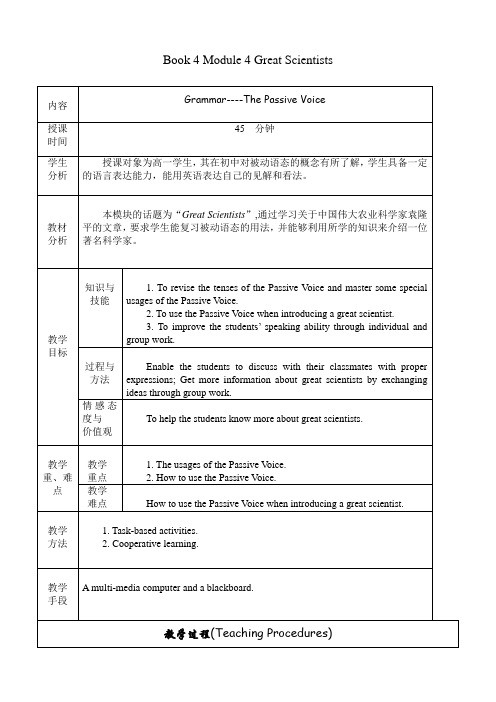
Book 4 Module 4 Great ScientistsBook 4 Module4 Great ScientistsTask 1 Finish this form about the Passive V oice!Special Usages:1. 某些动词 _______________等+ 副词,说明主语的某种属性特征时,动词用主动形式表被动的概念。
2. _______________ 值得被…3. 不定式作状语修饰充当表语的形容词如____________________________等词时,要用不定式的主动形式表被动的含义。
Task 2 Multiple choice.1. --- Have you moved into the new house?--- Not yet. The rooms _______.A. are being paintedB. are paintingC. are paintedD. are being painting2. These books were so popular that they _____ in no time.A. have soldB. would sellC. had been soldD. were sold3. The old with no relatives in the village ____ care of by the volunteers.A. are takingB. are takenC. is takingD. is taken4. By the end of last year, two new schools _____ in our city.A. would be completedB. were being completedC. have been completedD. had been completed5. His new book _______ next month.A. will be publishedB. is publishingC. is being publishedD. has been published6. It is said that he _____ sent to America to improve his English.A. would beB. was to beC. has beenD. had been7. ---What do you think of the book?--- Oh, excellent! It’s worth _____a second time.A. to readB. to be readC. readingD. being read8. The water in the river is safe ______.A. to be drunkB. to drinkC. being drunkD. DrinkingTask 3 Fill in the correct forms of the following verbs.Yuan Longping, who ________ (know) as “the Father of Hybrid Rice”, ________ (believe) to be the greatest Agricultural Scientist in China.He was born in 1930 and ________ (bring up) in China. He started to experiment with different types of rice in 1964. Finally, in 1970 a naturally sterile male rice plant ________ (discover), which played an important part in increasing Chinese rice production. Also, his rice _______ (export) to other countries and ________(sell) well there.Yuan ___________ (award) many prizes for his contributions. In my opinion, he is worth _________(respect).Task 4 Find out sentences related to the following topics from the passage above!。
英语必修ⅳ外研版module4greatscientists教案
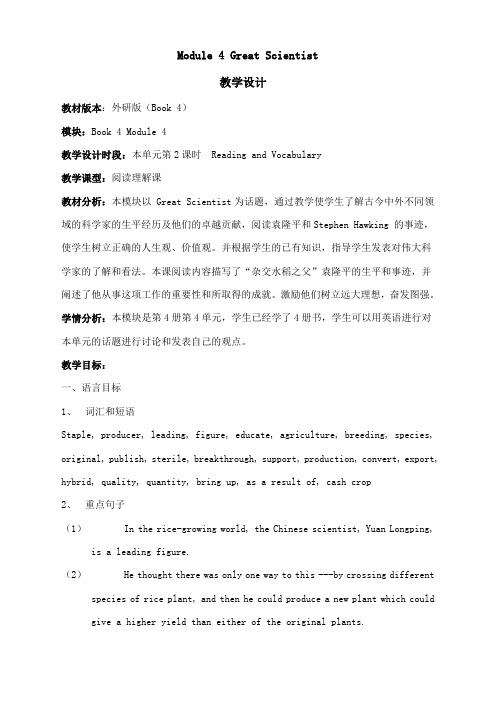
Module 4 Great Scientist教学设计教材版本:外研版(Book 4)模块:Book 4 Module 4教学设计时段:本单元第2课时 Reading and Vocabulary教学课型:阅读理解课教材分析:本模块以 Great Scientist为话题,通过教学使学生了解古今中外不同领域的科学家的生平经历及他们的卓越贡献,阅读袁隆平和Stephen Hawking 的事迹,使学生树立正确的人生观、价值观。
并根据学生的已有知识,指导学生发表对伟大科学家的了解和看法。
本课阅读内容描写了“杂交水稻之父”袁隆平的生平和事迹,并阐述了他从事这项工作的重要性和所取得的成就。
激励他们树立远大理想,奋发图强。
学情分析:本模块是第4册第4单元,学生已经学了4册书,学生可以用英语进行对本单元的话题进行讨论和发表自己的观点。
教学目标:一、语言目标1、词汇和短语Staple, producer, leading, figure, educate, agriculture, breeding, species, original, publish, sterile, breakthrough, support, production, convert, export, hybrid, quality, quantity, bring up, as a result of, cash crop2、重点句子(1)In the rice-growing world, the Chinese scientist, Yuan Longping, is a leading figure.(2)He thought there was only one way to this ---by crossing different species of rice plant, and then he could produce a new plant which could give a higher yield than either of the original plants.(3)As a result of Yuan Longping’s discoveries Chinese rice production rose by 47.5 perc ent in the 1990’s二、能力目标1、Enable students to talk about “the father of hybrid rice—Yuan Longping”2、Understand the text answer the related questions.3、Enable the students to understand the details about the passage, choosingthe correct answer according to the text and fill in the form about the passage.三、学能目标Help students learn how to talk about Yuan Longping and his achievements. 教学重点:1 Talk about “the father of hybrid rice---Yuan Longping”When and where was he born?Why was he famous?What did he discover?How important is the discovery?2 Discuss the question of comprehension:Why is Yuan Longping’s discovery very important?教学难点:1 Understand the importance of scientists’ achievements.2 Discuss the questions:What would you think of the new hybrid rice if you are a rice farmer? Explain why.Is the title of the passage suitable? If not, write a new one and give the reasons.3 Discuss what the students can learn from Yuan Longping.教学方法:1 Skimming and scanning2 Asking- and- answering activity in understanding the text.3 Discussion.Teaching procedures(教学过程):Step One Warming upShow the students some pictures of great scientists and ask them to talk about who they are and what achievements they had. Then show some pictures of Yuan Longping. Ask the students if they know something about him.(首先在屏幕上呈现一些著名科学家的图片,让学生讨论是否他们了解这些科学家,其目的是导入我国著名的科学家袁隆平这一话题)Step Two Reading1 ScanningGet the students to comprehend the passage quickly. Tell the students to look through the whole passage to get the general ideas of the passage. Encourage the students to express their different opinions in English. Then ask the students to look at the title of the passage. Ask the students if the title of the passage is suitable. If not, write a new one and give the reasons. Ask them to discuss with their partners.(这一环节目的是让学生快速阅读课文并了解文章大意,讨论文章的标题是否合适,可用什么标题来替换)2 Choose the best answer.(1)How could he manage to produce more ricequickly ?A.By crossing different species of rice plantB.By planting more riceC.By bringing in rice from other countriesD. By doing more experiments(2)The last two paragraphs mainly talk about___.A.China’s agriculture developmentB.Yuan Longping’s elderly lifeC.foreign countries’s agriculture revolutionD. Yuan Longping’s contributions to China and the world’s population (在屏幕上呈现以上的选择问题,检测学生是否了解文章大意)3 Find out the topic sentences.Para 1 Yuan Longping is a leading figure in the rice-growing world.Para 2 As a boy, he was called “the student who asked questions”.Para 3 As a young teacher, he began experiments in crop breeding.Para 4 He discovered a special type of rice.Para 5 His discoveries increased Chinese rice production.Para 6 The yield of the new hybrid rice is much greater than that of other types grown in Pakistan.(通过寻找The topic sentences的活动,让学生进一步的阅读和理解文章大意)4Read the passage again and judge the statements True of False.(1) China produces more rice than any other country.(2) Yuan Longping asked a lot of questions at school.(3) He developed a new kind of fast-growing rice.(4) The government helped him in his research.(5) The new rice replaced vegetables in 50 thousand square kilometers.(6) The new rice is now grown in other countries, such as Pakistan.(本环节目的是通过True or False questions 的练习使学生加深对课文的理解)5 Fill in the blank.Yuan Longping is a leading figure in the __________ world. As a boy, he was called “the student who asks question” . As a young teacher, he began _________ in crop ________. He thought that the ___ to feeding people was to have more rice and to produce it more quickly. In 1970 a naturally male rice plant was discovered. This was the ___________. As a result of this, Chinese rice production rose __47.5percent. The _____of the new rice is much greater than that of other types of rice grown in Pakistan.(这一项练习目的是帮助学生更好的了解袁隆平的生平与他的贡献,通过本项练习,指导学生如何进行课文的复述,这也是这一节课教学所要达到的能力目标之一。
教案1:高中英语外研版必修4Module4GreatScientists
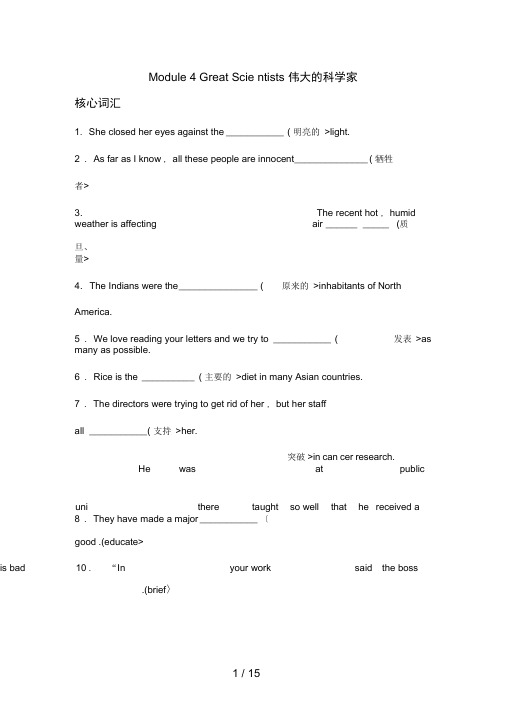
Module 4 Great Scie ntists 伟大的科学家核心词汇1. She closed her eyes against the ___________ ( 明亮的>light.2 . As far as I know , all these people are innocent ______________ ( 牺牲者>3. The recent hot , humid weather is affecting air ______ _____ (质旦、量>4. The Indians were the _______________ ( 原来的>inhabitants of North America.5 . We love reading your letters and we try to ___________ ( 发表>as many as possible.6 . Rice is the __________ ( 主要的>diet in many Asian countries.7 . The directors were trying to get rid of her , but her staffall ___________ (支持>her.8 . They have made a major ___________ 〔.(educate>.(brief〉突破>in can cer research.He was at public university.Thethere taught so well that he received agood,10 . “In your workis bad said the bossl.brilli a nt 4.origi nal 5.publish,6.staple7.supported 8.breakthrough cated ;educators ;educationlO.brief ;briefly高频短语1.培养;养育2 .带进:引进:挣得3.由于……的结果4 .因/以……而闻名/出名5 .从……来:源于6 .谋生7 .掌权:执政8 .对……进行实验9._ 偶然,意外地10.被系/捆在……上11.从……毕业12.被诊断为13.沿笔直的方向14.目前,现在1.bring up2.bring in3.as a result of4.be known for,e from6.make/eara (one' s> living e to/into power 8.experiment n/getwith 9.by accident 10.be attached to 11.graduate from12.bediag no sed with 13.i n a straight directi on 14.at prese nt重点句式1. In the ,the Chinese scientist , Yuan Longping , isa ______________ .在水稻种植领域,中国科学家袁隆平是一位杰出人士。
英语外研版高中必修4Great scientists优秀导教案
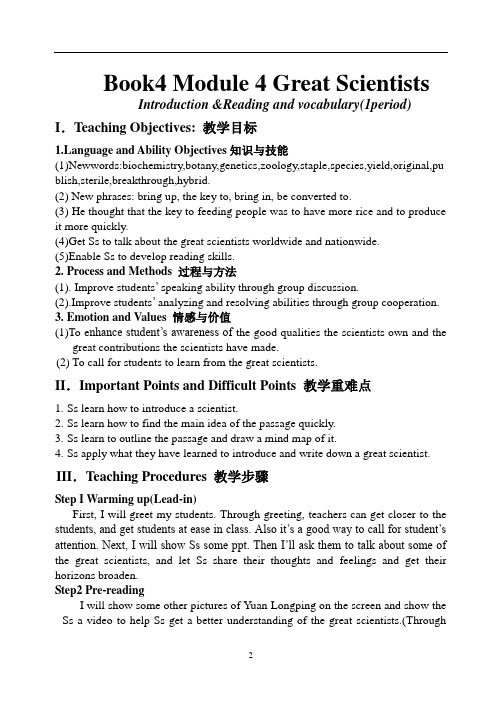
Book4 Module 4 Great Scientists Introduction &Reading and vocabulary(1period) I.Teaching Objectives: 教学目标nguage and Ability Objectives知识与技能(1)Newwords:biochemistry,botany,genetics,zoology,staple,species,yield,original,pu blish,sterile,breakthrough,hybrid.(2) New phrases: bring up, the key to, bring in, be converted to.(3) He thought that the key to feeding people was to have more rice and to produce it more quickly.(4)Get Ss to talk about the great scientists worldwide and nationwide.(5)Enable Ss to develop reading skills.2. Process and Methods 过程与方法(1). Improve students’ speaking ability through group discussion.(2).Improve students’ analyzing and resolving abilities through group cooperation.3. Emotion and Values 情感与价值(1)To e nhance student’s awareness of the good qualities the scientists own and thegreat contributions the scientists have made.(2) To call for students to learn from the great scientists.II.Important Points and Difficult Points教学重难点1.Ss learn how to introduce a scientist.2.Ss learn how to find the main idea of the passage quickly.3.Ss learn to outline the passage and draw a mind map of it.4.Ss apply what they have learned to introduce and write down a great scientist. III.Teaching Procedures 教学步骤Step I Warming up(Lead-in)First, I will greet my students. Through greeting, teachers can get closer to the students, and get students at ease in class. Also it’s a good way to call for student’s attention. Next, I will show Ss some ppt. Then I’ll ask them to talk about some of the great scientists, and let Ss share their thoughts and feelings and get their horizons broaden.Step2 Pre-readingI will show some other pictures of Yuan Longping on the screen and show the Ss a video to help Ss get a better understanding of the great scientists.(Throughthis, Ss may be curious about the p assage and can inspire the Ss’ to read the passage more actively.)Step3 While-readingFirstly, I would like to give 3 minutes to have a global reading, and Ss should find out the main idea of the passage. Then ask the Ss to draw a mind map of it.(Fast reading can help Ss understand the whole passage quickly and their skimming skills can be trained.)Then it should be detailed reading. In this section, Ss will be required to read the passage carefully and we will check the answer of some exercises together. (In this activity, Ss will comprehend the passage in detail and their reading ability of getting specific information will be improved.)Step4 Post-readingNow it should be the post-reading. In order that Ss can understand the lesson, I will ask Ss to discuss What Contribute to Yuan’s Success together. At last I will make a conclusion for them. (Work in groups can make sure that all Ss will take part in class and can communicate with others in English.)Step5 HomeworkIt is necessary to ask them to do some homework. So the homework is to read the passage again and again and then write a passage using the title “A Great Scientist”. (The homework is relative to what we have learnt today, and can appl y what we have learned to daily life)IV. Blackboard design板书设计Blackboard design is very important for teaching. My blackboard design is quite simple and clear. The following can best present it.。
(完整版)高一英语外研版必修4module4GreatScientists教案
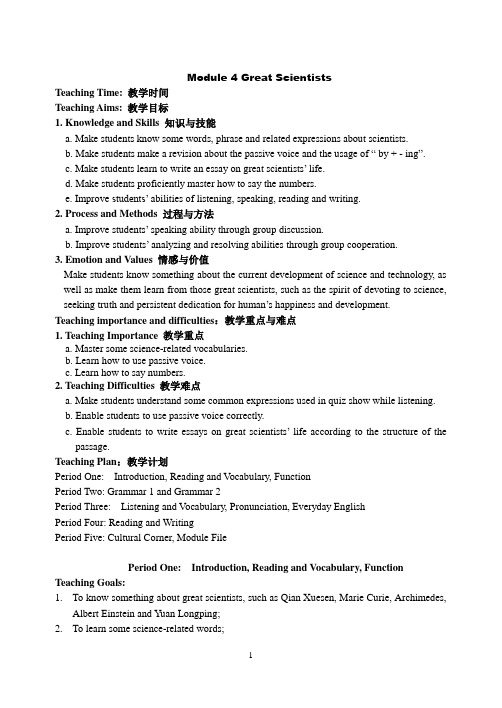
Module 4 Great ScientistsTeaching Time: 教学时间Teaching Aims: 教学目标1. Knowledge and Skills 知识与技能a. Make students know some words, phrase and related expressions about scientists.b. Make students make a revision about the passive voice and the usage of “ by + - ing”.c. Make students learn to write an essay on great scientists’ life.d. Make students proficiently master how to say the numbers.e. Improve students’ abilities of listening, speaking, reading and writing.2. Process and Methods 过程与方法a. Improve students’ speaking ability through group discussion.b. Improve students’ analyzing and resolving abilities through group cooperation.3. Emotion and Values 情感与价值Make students know something about the current development of science and technology, as well as make them learn from those great scientists, such as the spirit of devoting to science, seeking truth and persistent dedication for human’s happiness and development.Teaching importance and difficulties:教学重点与难点1. Teaching Importance 教学重点a. Master some science-related vocabularies.b. Learn how to use passive voice.c. Learn how to say numbers.2. Teaching Difficulties 教学难点a. Make students understand some common expressions used in quiz show while listening.b. Enable students to use passive voice correctly.c. Enable students to write essays on great scientists’ life according to the structure of thepassage.Teaching Plan:教学计划Period One:Introduction, Reading and V ocabulary, FunctionPeriod Two: Grammar 1 and Grammar 2Period Three: Listening and V ocabulary, Pronunciation, Everyday EnglishPeriod Four: Reading and WritingPeriod Five: Cultural Corner, Module FilePeriod One: Introduction, Reading and Vocabulary, Function Teaching Goals:1.To know something about great scientists, such as Qian Xuesen, Marie Curie, Archimedes,Albert Einstein and Yuan Longping;2.To learn some science-related words;3.To learn how to say numbers.Teaching Procedures:Step 1: Lead in----- IntroductionBrainstorm:Question: What great scientists do you know? ( free speaking )Make students say something about those four great scientists--- Qian Xuesen, Marie Curie,Make students finish exercise 2 on page 31 individually.The answers:1. zoology2. botany3. biology4. physics5. biochemistry6. chemistry7. genetics Step 2:Reading and Vocabulary1.From the title “The Student Who Asked Questions”, guess what the passage is about?Who is the student?2. Make students find the topic sentence of each paragraph.Para1: Yuan Longping is a leading figure in the rice-growing world.Para2: As a boy, he was called “the student who asked questions”.Para3: As a young teacher, he began experiments in crop breeding.Para4: He discovered a special type of rice plant.Para5:His discoveries increased Chinese rice production.Para6:The yield of the new hybrid rice is much greater than that of other types grown in Pakistan.3. Make students skim the passage and find the answers to the following questions.1)What kind of student was Yuan Longping when he was young?2)What way did he think to produce rice more quickly?3)What did he discover?4)How important was the discovery?The possible answers:1)He was a student with lots of questions and he was interested in plants.2)By crossing different species of rice plant, then he could produce a new plant which could give a higher yield than either of the original plants.3)He discovered a naturally sterile male rice plant.4)Chinese rice product ion rose by 47.5% in the 1990’s.There were other advantages.●50,000 square kilometers of rice fields were converted to growing vegetables and othercash crops.●Yuan’s rice was exported to other countries.●His rice’s yield is much greater than the yield of other types of rice grown in Pakistan. 4.Make students read the passage carefully and decide whether the statement are true or false.1). China produces more rice than any other country.2). Yuan Longping asked a lot of questions at school.3). He developed a new kind of fast-growing rice.4). The government helped him in his research.5). The new rice replaced vegetables in 50 thousand square kilometers.6). The new rice is now grown n other countries, such as Pakistan.The answers: TTTTFT5. Make students finish exercises in activity 3 and 4 on page 33 individually, then checkthe answers.Step 3: Language points1.He thought that (the key to feeding people was to have more rice and to produce itmore quickly.) 宾语从句the key to sth. / doing sth. ---的关键to 属于“介词”e.g. 这就是考试失败的关键。
外研版 高一 必修四 Module4 Great scientist说课稿讲课教案
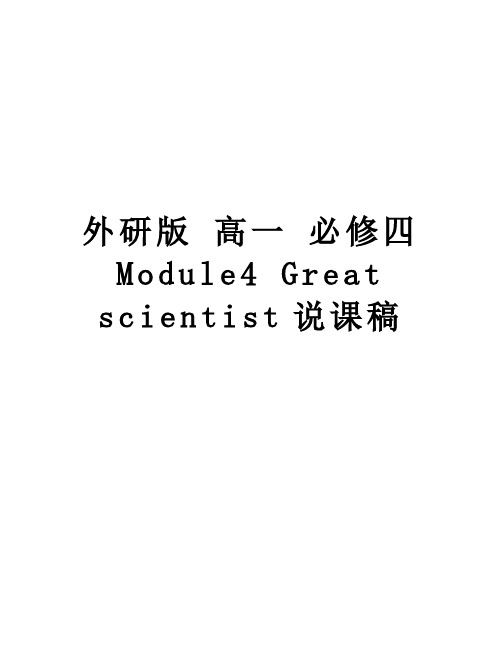
外研版高一必修四M o d u l e4G r e a ts c i e n t i s t说课稿Module 4 Great ScientistsPeriod 1 Reading and Vocabulary& SpeakingModule 4 Great ScientistsPeriod 1 Reading and Vocabulary& Speaking——说课稿一、说教材(一)教材内容及分析我说课的内容是外研版《英语》(新标准)高中第四册(必修四)Module4 Great Scientists的Reading and Vocabulary的短文阅读以及Speaking 的口语训练。
本模块以Great Scientists为话题,介绍了中国杂交水稻之父——袁隆平的故事,旨在通过本模块的教__________________________________________ ________学使学生描述科学家及其生平,并能运用所学词汇、句型来表达一个完整的记叙题材故事,从而培养其语言表达以及写作能力。
Introduction部分主要介绍了四位伟大的科学家,并通过讨论形式了解相关词汇;Reading and Vocabulary 部分要求学生利用所学词汇阅读短文,了解袁隆平生平。
训练学生速读、精读的能力。
(二)教学目标根据《新课标》总目标描述,结合本课内容,我把本节课的教学目标系统化,分别是:语言知识、能力目标、情感目标、文化意识,和学习策略。
1. 语言知识目标掌握并能运用下列词汇:__________________________________________ ________Rice-growing world, a leading figure, the key to, cross, yield, be converted to, the new hybrid rice, cash crop…2. 语言技能目标运用本节课所学词汇,理解短文,了解袁隆平的个人经历,获取信息和理解作者意图;简单描述某一科学家生平。
高一英语教案:Module 4 Great Scientists(外研版4)
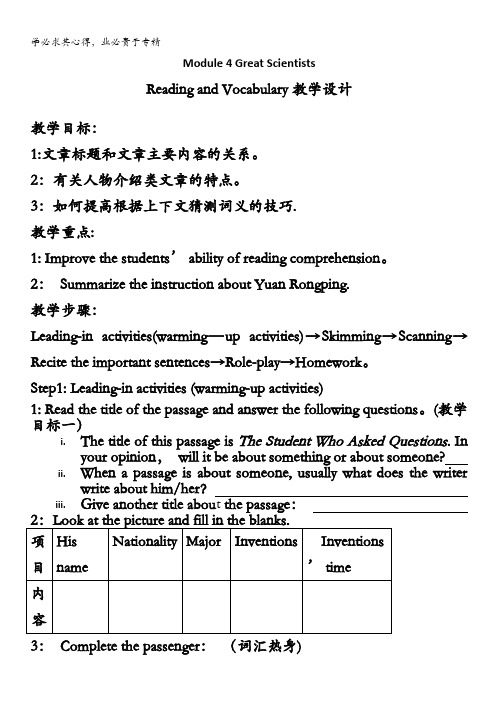
Module 4 Great ScientistsReading and Vocabulary教学设计教学目标:1:文章标题和文章主要内容的关系。
2:有关人物介绍类文章的特点。
3:如何提高根据上下文猜测词义的技巧.教学重点:1: Improve the students’ ability of reading comprehension。
2:Summarize the instruction about Yuan Rongping.教学步骤:Leading-in activities(warming—up activities)→Skimming→Scanning→Recite the important sentences→Role-play→Homework。
Step1: Leading-in activities (warming-up activities)1: Read the title of the passage and answer the following questions。
(教学目标一)i.The title of this passage is The Student Who Asked Questions. Inyour opinion,will it be about something or about someone?ii.When a passage is about someone, usually what does the writer write about him/her?iii.Give another title abou t the passage:3:Complete the passenger:(词汇热身)In rice —growing world , the Chinese scientist, Yuan Long —ping, is a _________ __________。
外研版高中英语必修4《odule 4 Great Scientists Grammar》优质课教案_4
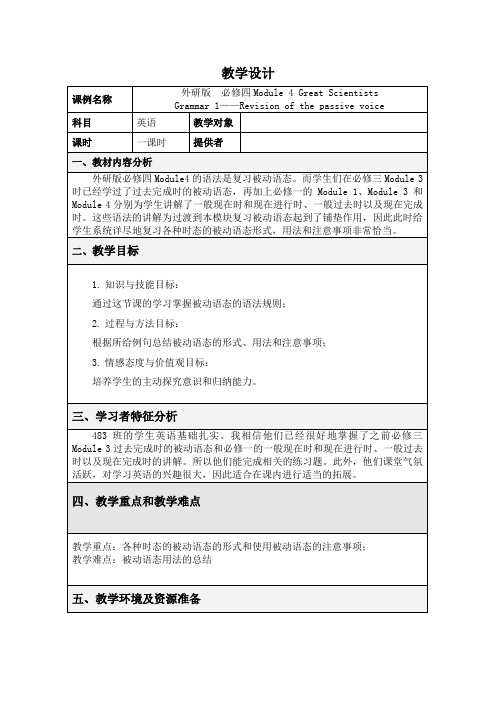
教学重点:各种时态的被动语态的形式和使用被动语态的注意事项;
教学难点:被动语态用法的总结
五、教学环境及资源准备
本节课是在孝义中学录播课教室教完成的,录播室中有电子白板设备。本人精心制作了PPT,挑选了难度适中的练习题供学生完成。
六、教学过程
教学过程
教师活动
学生活动
设计意图及资源准备
完成3组练习题
带领学生做相关的练习题
集体或者个别说出答案并且总结被动语态的形式、用法以及注意事项。
学生在完成3组练习后分别总结出被动语态的形式、用法以及注意事项。此过程培养了学生的主动探究意识和分析总结能力。
道德教育
给出中外名人关于主动和被动的名言
阅读名言并思考
培养并鼓励学生在生活中一定要积极主动而不是消极被动。
教学设计
课例名称
外研版 必修四Module 4 Great Scientists
Grammar 1——Revision of the passive voice
科目
英语
教学对象
课时
一课时
提供者
一、教材内容分析
外研版必修四Module4的语法是复习被动语态。而学生们在必修三Module 3时已经学过了过去完成时的被动语态,再加上必修一的Module 1、Module 3和Module 4分别为学生讲解了一般现在时和现在进行时、一般过去时以及现在完成时。这些语法的讲解为过渡到本模块复习被动语态起到了铺垫作用,因此此时给学生系统详尽地复习各种时态的被动语态形式,用法和注意事项非常恰当。
总结
给出本节课大纲
根据大纲一起总结本节课内容
小结本节课的学习内容,给学生一个完整的轮廓。
布置作业
外研版高中英语必修4《odule 4 Great Scientists Grammar》优质课教案_11
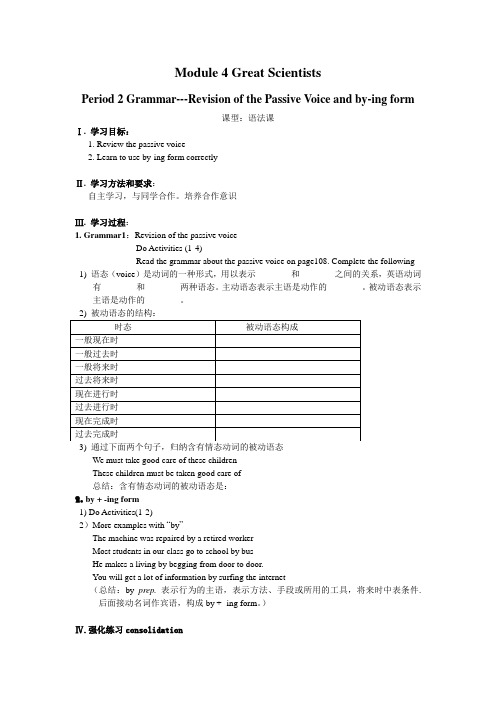
Module 4 Great ScientistsPeriod 2 Grammar---Revision of the Passive Voice and by-ing form课型:语法课Ⅰ. 学习目标:1. Review the passive voice2. Learn to use by-ing form correctlyⅡ. 学习方法和要求:自主学习,与同学合作。
培养合作意识Ⅲ. 学习过程:1. Grammar1:Revision of the passive voice------Do Activities (1-4)------Read the grammar about the passive voice on page108. Complete the following 1) 语态(voice)是动词的一种形式,用以表示________和________之间的关系,英语动词有________和________两种语态。
主动语态表示主语是动作的________。
被动语态表示主语是动作的________。
3) 通过下面两个句子,归纳含有情态动词的被动语态We must take good care of these childrenThese children must be taken good care of总结:含有情态动词的被动语态是:______________________________2. by + -ing form1) Do Activities(1-2)2)More examples with “by”The machine was repaired by a retired workerMost students in our class go to school by busHe makes a living by begging from door to door.You will get a lot of information by surfing the internet(总结:by prep. 表示行为的主语,表示方法、手段或所用的工具,将来时中表条件.后面接动名词作宾语,构成by + -ing form。
外研版高中英语必修4《odule 4 Great Scientists Grammar》优质课教案_5
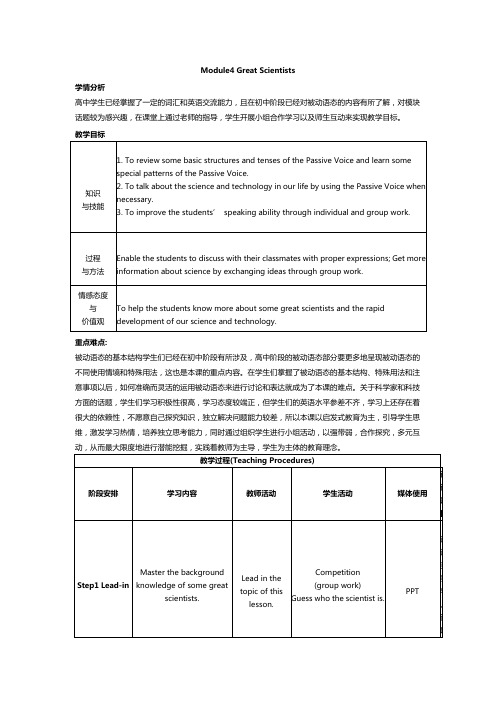
Module4 Great Scientists
学情分析
高中学生已经掌握了一定的词汇和英语交流能力,且在初中阶段已经对被动语态的内容有所了解,对模块话题较为感兴趣,在课堂上通过老师的指导,学生开展小组合作学习以及师生互动来实现教学目标。
重点难点:
被动语态的基本结构学生们已经在初中阶段有所涉及,高中阶段的被动语态部分要更多地呈现被动语态的不同使用情境和特殊用法,这也是本课的重点内容。
在学生们掌握了被动语态的基本结构、特殊用法和注意事项以后,如何准确而灵活的运用被动语态来进行讨论和表达就成为了本课的难点。
关于科学家和科技方面的话题,学生们学习积极性很高,学习态度较端正,但学生们的英语水平参差不齐,学习上还存在着很大的依赖性,不愿意自己探究知识,独立解决问题能力较差,所以本课以启发式教育为主,引导学生思维,激发学习热情,培养独立思考能力,同时通过组织学生进行小组活动,以强带弱,合作探究,多元互。
- 1、下载文档前请自行甄别文档内容的完整性,平台不提供额外的编辑、内容补充、找答案等附加服务。
- 2、"仅部分预览"的文档,不可在线预览部分如存在完整性等问题,可反馈申请退款(可完整预览的文档不适用该条件!)。
- 3、如文档侵犯您的权益,请联系客服反馈,我们会尽快为您处理(人工客服工作时间:9:00-18:30)。
Module 4 Great ScientistsTeaching Time:教学时间Teaching Aims:教学目标1. Knowledge and Skills知识与技能a. Make students know some words, phrase and related expressions about scientists.b. Make students make a revision about the passive voice and the usage of “by + - ing ”.c. Make students learn to write an essay on great scientists ’life.d. Make students proficiently master how to say the numbers.e. Improve students abilities’ of listening, speaking, reading and writing.2. Process and Methods过程与方法a. Improve students’speaking ability through group discussion.b. Improve students ’analyzing and resolving abilities through group cooperation.3. Emotion and Values情感与价值Make students know something about the current development of science and technology, as well as make them learn from those great scientists, such as the spirit of devoting to science, seeking truth and persistent dedication for human ’s happiness and development. Teaching importance and difficulties:教学重点与难点1. Teaching Importance教学重点a. Master some science-related vocabularies.b. Learn how to use passive voice.c. Learn how to say numbers.2. Teaching Difficulties教学难点a. Make students understand some common expressions used in quiz show while listening.b. Enable students to use passive voice correctly.c. Enable students to write essays on great scientists’life according to the structure of thepassage.Teaching Plan :教学计划Period One: Introduction, Reading and V ocabulary, FunctionPeriod Two: Grammar 1 and Grammar 2Period Three:Listening and V ocabulary, Pronunciation, Everyday EnglishPeriod Four: Reading and WritingPeriod Five: Cultural Corner, Module FilePeriod One:Introduction, Reading and Vocabulary, FunctionTeaching Goals:1.To know something about great scientists, such as Qian Xuesen, Marie Curie, Archimedes,Albert Einstein and Yuan Longping;3.To learn how to say numbers.Teaching Procedures:Step 1: Lead in----- IntroductionBrainstorm:Question: What great scientists do you know? ( free speaking )Make students say something about those four great scientists--- Qian Xuesen, Marie Curie, Archimedes, Albert Einstein.Name Nationality Major Invention/Discovery Time of thediscoveryQian Xuesen China Physics, Chinese atom bomb In 1964MathematicsMarie Curie Poland Physics Radioactivity In 1898Archimedes Sicily in Italy Physics, buoyancy About 240 BCmathematicsAlbert Einstein Germany / Mathematical relativity In 1905America PhysicsMake students learn some words of different fields in science.Subjects Chinese meaning The person who research the subjects Biochemistry 生化学BiochemistBiology 生物学BiologistBotany 植物学BotanistChemistry 化学ChemistGenetics 遗传学GeneticistPhysics 物理学PhysicistZoology 动物学ZoologistMake students finish exercise 2 on page 31 individually.The answers:1. zoology2. botany3. biology4. physics5. biochemistry6. chemistry7. genetics Step 2:Reading and Vocabulary1. From the title“ The Student Who Asked Questions” , guess what the passage is about?Who is the student?Question: What do you know about Y uan Longping?Name Nationality Major Invention/Discovery Time of thediscoveryYuan Longping China Agriculture Hybrid rice In 19702. Make students find the topic sentence of each paragraph.Para1: Yuan Longping is a leading figure in the rice-growing world.Para2: As a boy, he was called“ the student who asked questions”. Para3: As a young teacher, he began experiments in crop breeding.Para4: He discovered a special type of rice plant.Para5: His discoveries increased Chinese rice production.Para6: The yield of the new hybrid rice is much greater than that of other types grown in Pakistan.3. Make students skim the passage and find the answers to the following questions.1) What kind of student was Yuan Longping when he was young?2) What way did he think to produce rice more quickly?3) What did he discover?4) How important was the discovery ?The possible answers:1) He was a student with lots of questions and he was interested in plants.2) By crossing different species of rice plant, then he could produce a new plant which could give a higher yield than either of the original plants.3) He discovered a naturally sterile male rice plant.4) Chinese rice product ion rose by 47.5% in the 1990’ s.There were other advantages.50,000 square kilometers of rice fields were converted to growing vegetables and other cash crops.Yuan’ s rice wasexported to other countries.His rice ’ s yield is much greater than the yieldofother types of rice grown in Pakistan. 4.Make students read the passage carefully and decide whether the statement are true or false.1). China produces more rice than any other country.2). Yuan Longping asked a lot of questions at school.3). He developed a new kind of fast-growing rice.4). The government helped him in his research.5). The new rice replaced vegetables in 50 thousand square kilometers.6). The new rice is now grown n other countries, such as Pakistan.The answers: TTTTFT5. Make students finish exercises in activity 3 and 4 on page 33 individually, then checkthe answers.Step 3: Language points1.He thought that (the key to feeding people was to have more rice and to produce itmore quickly.)宾语从句the key to sth. / doing sth. ---的关键to 属于“介词”e.g. 这就是考试失败的关键。
